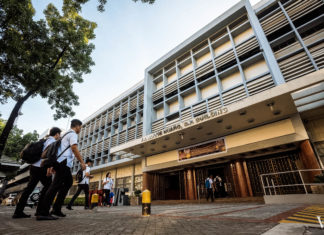THE PARENTS of slain Civil Law freshman Horacio “Atio” Castillo III have refuted claims their son died of heart disease and not because of the hazing rites of Aegis Juris Fraternity.
Horacio Castillo Jr. told reporters last Oct. 24 after the preliminary investigation of the Department of Justice (DOJ) that his son was healthy upon entering the University, contrary to claims of lead suspect John Paul Solano that Atio died because of a pre-existing heart disease called hypertrophic cardiomyopathy (HCM), or the thickening of the walls of the heart due to enlarged heart muscle cells.
“Before [Atio] went to UST, the school requires a medical certificate. He was given a clean bill of health by the school. How could you say he has [a heart condition]?” Horacio Jr. told reporters.
Carmina Castillo, Atio’s mother, said Atio, 22, was a football player. “Wala siyang sakit sa puso. Palusot lang nila ‘yun.”
Horacio Jr. also questioned Solano’s credibility as a medical technologist, saying a cardiologist must explain the heart condition of his son.
Solano, 27, accused the Manila Police District (MPD) of covering up the real cause of Atio’s death, in an affidavit submitted to prosecutors. He claimed Atio did not die due to hazing injuries.
He cited findings of a medico-legal report last Sept. 18 that showed that Atio’s heart was “grossly enlarged and weighs 450 grams” and that he had HCM.
“[The Medico Legal Report] was conveniently omitted by complainants and the MPD in the instant complaints to apparently cover up the fact that the death of Horacio was brought about by cardiac failure due to HCM and not due to hazing,” Solano said in his counter-affidavit filed at the DOJ last Oct. 24.
Paterno Esmaquel, legal counsel of Solano, said the medico-legal officer of MPD did not reveal the complete medico-legal report during the senate probe.
“[The Medico-Legal Officer of MPD] was lying [when] she said that in the Senate hearing the cadaver of Atio could no longer be autopsied… Our position [is] that if there is someone making a cover up, it’s the MPD not the [Aegis Juris] Fraternity,” Esmaquel told reporters.
In a Senate probe last Oct. 18, Mesalyn Milagros Probadora, medico-legal officer of MPD, said Atio’s cause of death was “severe blunt traumatic injuries [on] both upper limbs.” Probadora confirmed the possibility that Atio died because he was beaten up.
Rommel Anicete, head of Manila Police District homicide division, said the final results of the examination of Atio’s body had yet to be released.
“There is an initial result and a supplementary [result]. But the crime laboratory will be the one to answer [as regards] the results of medical reports because there are medical terms that only they can understand,” Anicete told the reporters.
Frat members deny hazing, murder raps
Members of Aegis Juris also filed counter-affidavits denying their presence during the hazing rites and seeking the dismissal of hazing, murder, perjury and obstruction of justice cases filed against them by the Castillo family.
Ralph Trangia, sergeant at arms of Aegis Juris fraternity, said he left the country for Chicago via Taiwan on Sept. 19 to avoid threats from the public following Atio’s death last Sept. 17.
“It is thus but natural that I fear this continuous persecution and choose to at least be free of suspicions momentarily,” Trangia said in his counter-affidavit.
Trangia also disagreed that the vehicle that brought Atio’s body to the Chinese General Hospital would be sufficient evidence of his participation during the hazing rites at the Aegis Juris library and foundation office.
“Mere presence of the vehicle allegedly owned by my father in the vicinity of the frat library does not establish actual presence during the alleged hazing,” Trangia said in his counter-affidavit.
Axel Munro Hipe said allegations that he was the master initiator and an active member of Aegis Juris did not prove his presence during the incident.
“[That the] Respondent is listed as a member and an officer of the Aegis Juris fraternity does not establish probable cause that he was complicit or participated in the unfortunate demise of Atio,” Hipe said in his counter-affidavit.
Hipe added the Castillo family violated his “right to privacy of communications and correspondence” after checking online group chat messages, citing Section 3 of the Bill of Rights.
The Castillos claimed in their supplementary affidavit that Hipe invited fraternity members to the final initiation rites for a neophyte, as shown by a screenshot of the Aegis Juris group chat retrieved from the “Hustisya Para Kay Horacio” Facebook page.
Alvin Dysangco, one of the trustees of the Aegis Juris Foundation in 2002, denied allegations of the foundation’s involvement in the hazing incident.
“I am no longer a trustee and I have no personal knowledge if the Foundation is still operational,” Dysangco said in his counter-affidavit.
Dysangco added the foundation only sought to fund books, tables, chairs and other learning resources for the Aegis Juris library on the corner of Laong Laan and Navarra streets in Sampaloc, Manila.
Section 4 of RA 8049 or the Anti-Hazing Law of 1995 states that the officers and members of the fraternity, sorority or organization that actually participated in the initiation rites that caused physical injury or death shall be held liable. Also, mere presence of an individual in the hazing act entails a minimum punishment of prison correccional (imprisonment of 4 years, 2 months, and one day to 6 years).
The Castillos filed two supplementary affidavits last Oct. 9 at the DOJ. The first one accused 24 respondents of violating Article 183 of the Revised Penal Code (perjury) and Presidential Decree 1829 (obstruction of justice). The other accused more than 30 respondents of violating Republic Act 8049 or the Anti-Hazing Law of 1995 and Article 248 of Revised Penal Code (murder). with reports from Mia Arra C. Camacho and Erma R. Edera
To investigate and expose unspoken issues and anomalies, send confidential news tips to the Special Reports team of the Varsitarian at specialreports.varsitarian@gmail.com or at THE VARSITARIAN office, Rm. 105, Tan Yan Kee Student Center, University of Santo Tomas, España, Manila.


















